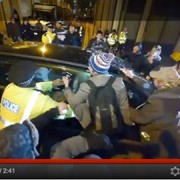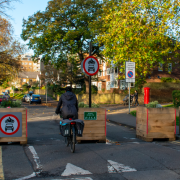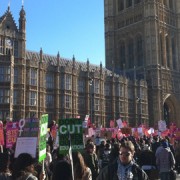Candidates for the London Assembly elections in City and East went head to head in an election debate organised by EastLondonLines on Tuesday evening.
Current Labour Assembly member John Biggs was joined by the Green Party’s Chris Smith, UKIP’s Steven Woolfe, the Liberal Democrats’ Richard MacMillan, and the Conservative Party’s John Moss.
An audience of local residents and political partisans pitched their questions to the panel chaired by veteran journalist and Goldsmiths tutor Terry Kirby.
The debate covered subjects from police racism through cycling safety to the housing crisis, which is particularly acute in the area. Unemployment and inequality were major concerns in a constituency which includes both the City of London and Tower Hamlets, the third most deprived borough in the country.
Watch this space for a video of the debate coming soon.
With all candidates advocating small and medium businesses as engines of economic recovery, EastLondonLines is also looking at start-ups throughout our boroughs. Click here to see our special feature.
Kirby opened the session by noting that City and East – covering Newham, Tower Hamlets, Barking and Dagenham, and the City – includes over half a million voters, and that within months “the eyes of the world” will be on east London for the 2012 Olympics.
On a day that saw a Metropolitan Police officer charged with racially abusing a suspect, institutional racism was first on the agenda. Biggs told the audience the Mayor of London had a statutory responsibility to promote equality of opportunities in London.
He said: “The Mayor needs to bang his shoe on the table – or whatever he has to hand – to ensure that the organisations he controls come to him with a strategy to iron these things out.”
But Moss warned: “When you have an independent police investigation ongoing, it’s incumbent on the Mayor to keep his hands off it.”
One audience member asked why no charges have been brought in relation to any of the 1429 people who have died in police custody so far, while Macmillan brought attention to racist abuse between the police officers.

UKIP candidate Steven Woolfe (standing) criticised the way the state used the police pic: Helen Crane
Woolfe said that liberty, not racism, was the issue, arguing that anti-terrorism laws are used to “target specific communities” but harm everyone.
He criticised the use of police to stop protests and demonstrations, saying: “The state is using the police as a politicised force, and I want to see that removed.”
An audience member asked the panel what they would do to “close the gap between rich and poor.” Moss, ebullient on the rights of the former, said: “You don’t make poor people rich by making rich people poor…If you try and punish rich people, rich people are rich enough to take their money elsewhere.”
He said London needed to generate economic activity in the private sector to drive up tax revenues for the private sector, and urged the audience to take personal responsibility for overseeing business they have a stake in.
But Biggs said: “There is a fundamental happiness in our country that when the going’s good the rich get richer, and when the going’s bad they seem to hang on to it.”
He declared his opposition to “widespread privatisation” and described the plight of those “who are only a couple of paychecks away from difficulty and said Britain needed “a new settlement” which bolsters capitalism with “a greater sense of equality.”
Moss attempted to intervene, to which Biggs dryly responded: “I didn’t heckle you, though I might do so in future.”
Woolfe argued that freezing business rates for small and medium enterprises would grow the economy, citing a business he knows in his native Pimlico which cannot afford to hire new employees due to a rate hike of 300 per cent over the last six years.
He also proposed reducing business rates for businesses that employ people from their local communities.
Macmillan blamed inequality on the “failed policies” of successive Labour and Conservative governments, saying businesses should be supported by a London green investment bank and a raising of the tax threshold to £10,000.
Smith pointed the finger at Labour for reducing regulation that allowed corporations to get away with tax evasion, and said the money needed to be reclaimed. He advocated narrowing the gap between rich and poor by reducing wage inequality, and supporting local businesses in favour of large chain stores.
Some discussion centred on the limited powers of the Assembly, with Kirby asking the candidates if they could actually do anything to solve London’s issues.
But Biggs said: “You can be critical of the London Assembly as a talking shop with no real powers, but if you look at the London Living Wage, that initially came out of the Assembly. There’s a lot of stuff we can do.”
Communist League candidate Paul Davies staged a small coup when he asked to stand up and make a statement in support of his policies and the crowd shouted “Let him speak!”
Davies said: “My campaign tells the truth about what capitalism does. They need unemployment; they drive competition for jobs up in order to drive wages and conditions down.”
“What we face is not a few greedy bankers, bad bosses or corrupt politicians, but a system of class rule, and working people need to rely on our own strength.”
He said future assaults workers would force them into “revolutionary struggle”, but drew titters when he urged them to do “what they did in Cuba fifty years ago.”
Many residents were concerned about the shortage of housing in the capital. Both Biggs and Smith urged changes in planning laws to demand more affordable homes, with Biggs warning that “fundamentally, for most people, housing is unaffordable in London.”
He said: “For people on low incomes there is a fundamental market failure in the private renters’.”
He wanted to challenge the government’s policy on housing benefit caps, which he said would produce a “geographically divided city.”
Smith proposed filling the “masses of empty houses” in Tower Hamlets to “bring those excluded from housing into the equation,” and pushed for regulation of “dangerous landlords.”
Moss, however, shifted focus to over- and under-occupation of public housing, urging a report on conditions and fairness in the public sector, while Woolfe said landlords should have their council tax frozen for a year if they renovate and rent out an affordable home.
Macmillan pledged the Liberal Democrats to a “massive council house building programme”, saying that under Labour house-building fell to its lowest level since the 1920s. He said: “We want to bring houses back into use, plus community land trusts…we believe in bringing unused public land into use for private investment.”
Tower Hamlets resident Terry McGrenera also stood briefly to represent his House Party, saying that housing was the single biggest issue affecting London. He said: “It’s scandalous that it hasn’t been so far that there isn’t a strategic housing authority for London.”
He accused past Mayors of a “dereliction of duty” and said he would be standing as a London-wide Assembly candidate to push for the creation of such an authority.
Watch our video interviews with the candidates here.
(Additional reporting by Raziye Akkoc)






